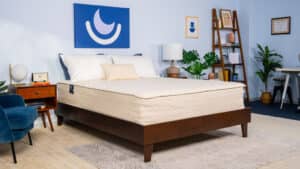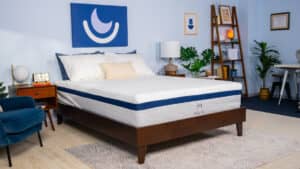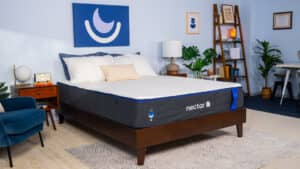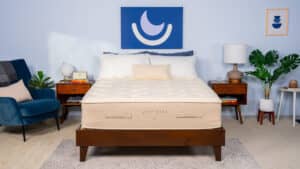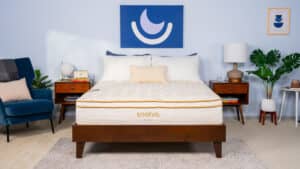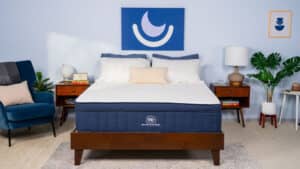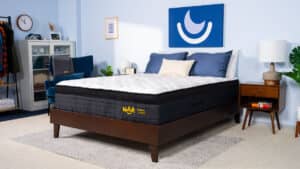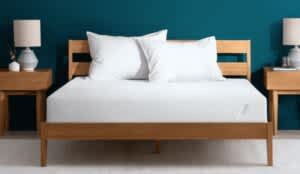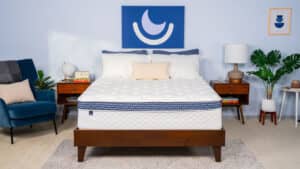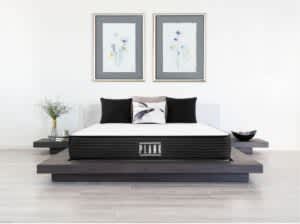Mattress manufacturers continually improve and update products to promote better sleep, and Celliant fiber is one of the numerous new technologies that’s been incorporated into mattresses and bedding.
The specialty textile is designed to reflect body heat back to the sleeper as infrared energy, with the goal of improving sleep quality and muscle recovery. With a focus on promoting quick recovery, Celliant fiber is typically marketed toward active people, especially runners and athletes. Products also include it to ease aches and pains or cool sleepers who tend to overheat.
We’ll cover how and why mattress manufacturers use this particular material, as well as how Celliant works and its potential benefits for sleepers.
What Is Celliant Fiber?
Created by Hologenix LLC, Celliant fiber is a proprietary textile designed to encourage fast recovery through increased circulation and improved tissue oxygenation. In addition to mattresses and bedding products, the material is often used in athletic apparel.
The synthetic material contains thermoreactive minerals, including silica and titanium dioxide, blended with 88 trace elements. It can be integrated into yarn or fiber or used as a fabric coating.
How Does It Work?
Our bodies naturally produce heat when we eat, exercise, and sleep. Since we’re constantly making heat, we also consistently emit heat to regulate body temperature. The natural minerals and elements in Celliant fiber capture body heat and convert it into full-spectrum infrared energy. By reflecting that energy back into the body, Celliant is designed to improve cellular oxygenation and local circulation for a more restful, rejuvenating sleep.
Let Us Help You Find the Perfect Bed
Answer a few questions to find the right mattress for your unique needs
How Is Celliant Fiber Used in Mattresses?
For the best results, Celliant must remain in close proximity to the skin. Celliant fiber is not used as a primary material, so mattress manufacturers typically weave it into the cover or top comfort layer material.
Any mattress type can include Celliant, though foam and hybrid beds tend to incorporate it more often. Sheets, pillowcases, and blankets can also include the specialty fiber.
Who Is Celliant Fiber Ideal For?
Celliant fiber is designed to increase circulation and cellular oxygenation, improve strength and stamina, and promote more restful sleep — all of which can aid recovery from intense physical activity and provide relief from aches and pains. Individuals who tend to sleep hot, athletes, and those who experience aches and pains are most likely to benefit from Celliant.
Hot Sleepers
Celliant is designed to absorb body heat and turn it into infrared energy. This dissipates excess heat, helping to regulate the sleeper’s body temperature for a cooler sleep.
Athletes
By enhancing muscle tissue oxygenation and improving sleep quality, Celliant fiber is intended to stimulate muscle recovery after intense training periods or competition.
Sleepers With Aches and Pains
According to the manufacturer, Celliant fiber can help with muscle recovery due to an increase in muscle tissue oxygenation, thus encouraging injuries to heal faster while reducing aches and pains. Celliant may also help reduce arthritis symptoms.
Is Celliant Fiber Safe?
There’s currently no evidence to suggest that Celliant fiber is not safe. To validate its claims regarding Celliant fiber, Hologenix created an independent advisory board consisting of scientists with a variety of specialities. These scientific experts oversee and perform rigorous clinical studies to substantiate the company’s claims.
Though the U.S. Food and Drug Administration has determined Celliant products are medical devices, it has not approved the company’s products or endorsed their use.
Ask the Sleep Doctor
Have questions about sleep? Submit them here! We use your questions to help us decide topics for articles, videos, and newsletters. We try to answer as many questions as possible. You can also send us an email. Please note, we cannot provide specific medical advice, and always recommend you contact your doctor for any medical matters.






























